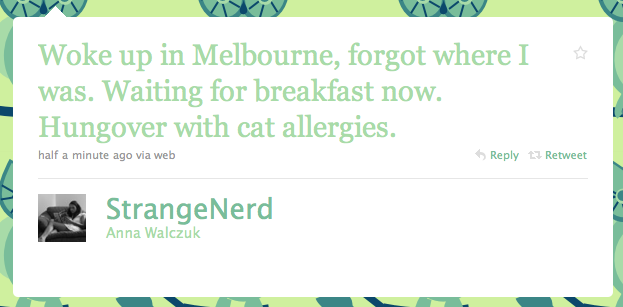Twitter is the pinnacle of the context-free information ladder. In this contest, it beats out television, which used to take the brunt of the abuse from communication technophobes. Judging by his book Amusing Ourselves to Death, Neil Postman was one such technophobe. Back in 1985, he maligned television for encouraging hebetude and even chipping away at democratic ideals.
According to Postman, television shortened attention span and caused people to become less apt to attend community activities on social and political matters.
Nowadays, some people criticize Twitter for similar reasons.
Like television, Twitter presents every new item disconnected from the previous one in rapid fashion that obliterates the need to search for content. Twitter does not only present disconnected information, it often presents incomplete information. 140 characters is a short space in which to express a complex idea. Moreover, it seems that the habit of reading in short grabs affects our capacity for reflection and the expression of related ideas. Digital Nation, a documentary on the effects of the internet on youth, showed that some MIT students have difficulty writing inter-related paragraphs.

Another supposed drawback is that Twitter (and other social media) cause people to become "fake" -- to project a fictionalized version of themselves. A recent New York Times article expounds on this possibility.
Bu, these negative effects are the result of misuse of the technology. Twitter, like every other technology, is predisposed to a certain kind of valuable usage.
Twitter is good for fostering a feeling of belonging, as blogs do. But, on Twitter the writer does not have to work as hard to get reactions. No one would read a blog that consisted of recommended links and one line notes about another person's day. But the immediacy of a tweet, the fact that you believe it is telling you what is happening to your contact as you speak, makes it alluring. This is the closest we can feel to people without being in their complicated, emotionally-charged presence.
In an society where more is more, we are constantly striving to be productive and the most scarce resource is time. Twitter allows us to do away with the challenge of having to choose one activity over another - having a coffee with a friend or working a few extra hours. On Twitter, you get the illusion that you are spending time together simply by sending a few humorous missives, while you work on your project. In this way, Twitter can be a virtual form of weisure -- a mix work and leisure.
If you are trying to reach a company, you no longer have to spend hours on the phone speaking to an automaton until you reach a human, you can just send them a quick missive on Twitter and hope for a reply. The length restriction on the messages forces both the customer and the company to be efficient at deploying information -- thinking things down to the essential- making the communication faster than email exchange. Leo Babautata, renowned writer of the blog zenhabits.net decided to do away with email and make Twitter his main form of communication for this reason (among others).
Twitter is easier for communication than email. Because of vestigal respect for the written word we feel we have to write about something of value in an email. On Twitter, you can just say "hey" to keep up with your correspondence.
To get mad at Twitter for not being efficient at fostering relationships is like asking the TV to talk back. Twitter is for information -- whether it is information about a product or your dog. Even when people respond, they are giving you information about what they feel not expressing what they feel because the medium itself does not allow spontaneous, slip of the tongue reprieves. You have to decide what you want to say and then pack it up so it fits on the line. Twitter is therefore not for connection.
As a truant Twitterer I always end up corresponding with my Twitter mates via email if I want to make a connection.
Another common complaint is "how can anyone think others are interested in their mundane details?" It's true that no stranger is interested in You. People are, however, very interested in the experience of you. Think of yourself as a Picasso portrait -- your left eye is painted from a different perspective than your nose. Such complexity cannot be conveyed into 140 characters. Therefore, on Twitter and other social media, you have to choose which side you want to show each time you participate.
However, the user is not being fake or fictionalizing himself. This exercise is no different than what most people do at a work. In the office space, people necessarily obscure parts of themselves and highlight others. Now, we're just doing it online.